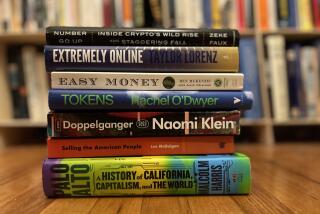‘Books’ of Future Will Speed Learning
- Share via
* Kudos is due your paper for publishing responses (Letters, July 17) to my ideas on future libraries. I am sorry that my point seemed lost in the warm sentiments for books. The crucial issue: There are mediums developing at a rapid pace that improve one’s ability to learn, be entertained and satisfied. An electronic travelogue that offered a full motion video of Paris might not be preferable to walking the streets of Paris, but it might be more accurately illustrative of Paris than a paper brochure (a mini-book?), even with photos included.
I have the utmost respect for books. They have given me some of my greatest moments of pleasure and learning; but things are changing. Some relevant facts: Comprehension levels greatly improve when students see videos or movies demonstrating principles or functions being learned. Think about it this way. If you were reading a history “book” about the Civil War and on the pages that describe the various battles (in words) you could touch a spot on the page and see the battle(s) taking place in full motion, full color, video, with sound, would your experience of the subject be enhanced? The professors of history writing in the journal History Microcomputer Review, which deals with interactive learning programs in the teaching of history in North American schools, think so.
The transition that printed books served took man from the era of limited information to the nearly universal access to information arriving at our doorstep now. As a society in a competitive world we need to learn how to learn much more a lot faster. Access to our new forms of “books” is of critical importance. Their characteristics will make people smarter, faster. Who will not want this for themselves or at least for their children?
JOHN P. STRAHL
Corona del Mar
* This is regarding the reduction in library services.
Somewhere out there is the future president of the United States. He’s 12 years old. The better educated he becomes the better for us. The better for the rest of the world.
Curtailing the hours he can get to the library or possibly closing the branch he can get to is not the way to build his education.
We deserve better than this. And so does the rest of the world.
HENRY S. LEAVITT
Laguna Beach
More to Read
Sign up for our Book Club newsletter
Get the latest news, events and more from the Los Angeles Times Book Club, and help us get L.A. reading and talking.
You may occasionally receive promotional content from the Los Angeles Times.










